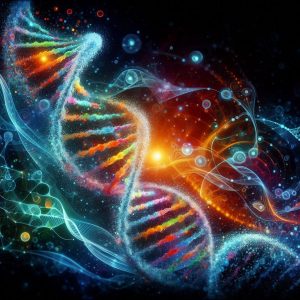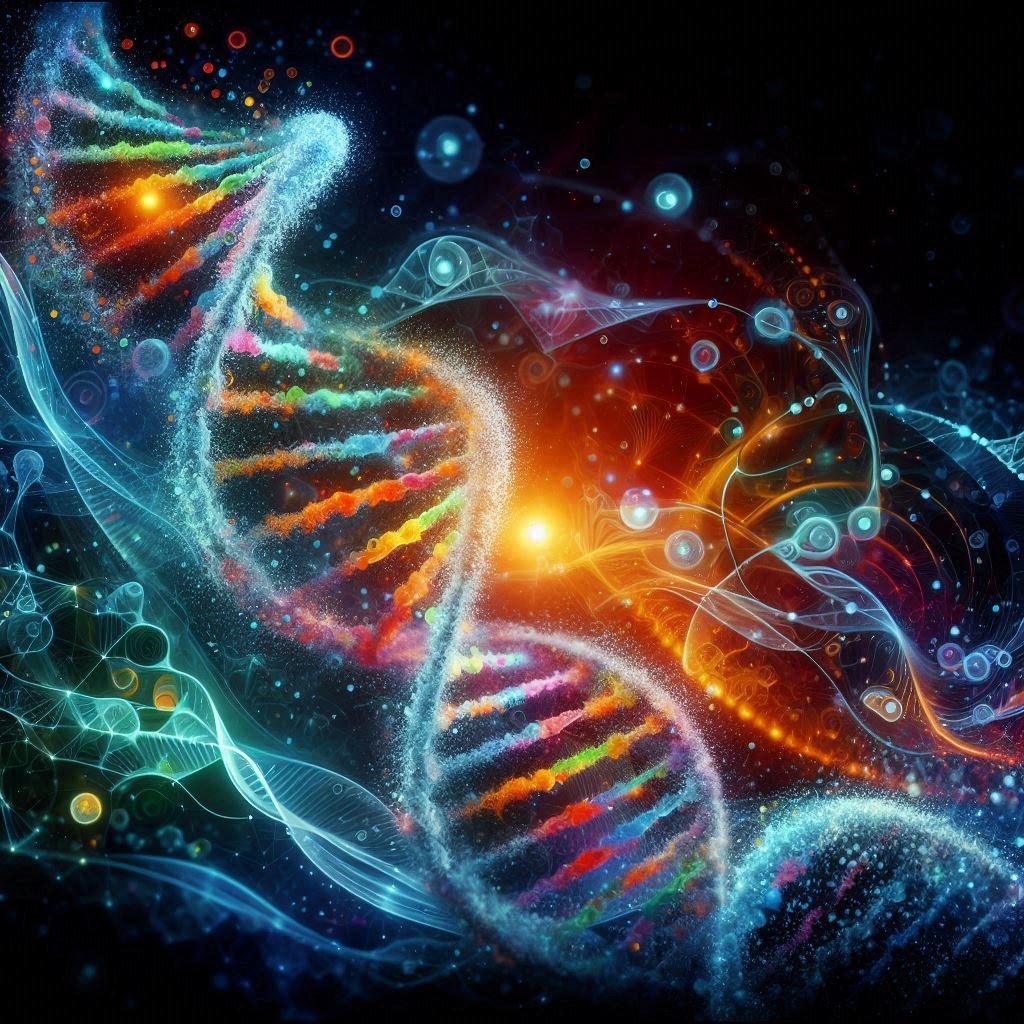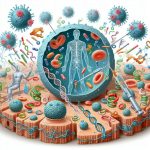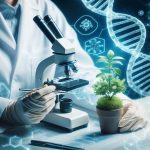What Are Mutations?
A mutation is defined as a permanent alteration in the DNA sequence that differs from the normal sequence. Mutations can occur spontaneously or be induced by external factors. They can range from a single nucleotide change to large-scale chromosomal alterations. These changes can impact the function of genes and the proteins they encode, potentially leading to a wide range of biological consequences.
Types of Mutations
Mutations can be classified into various types based on their nature and impact:
| Type of Mutation | Description | Examples |
|---|---|---|
| Point Mutation | Change in a single nucleotide base pair, which can lead to a change in one amino acid of a protein. | Sickle cell anemia, where a single nucleotide change causes red blood cells to become misshapen. |
| Insertion Mutation | Addition of one or more nucleotide base pairs into the DNA sequence, which can disrupt gene function. | Huntington’s disease, characterized by the expansion of CAG repeats in the HTT gene. |
| Deletion Mutation | Loss of one or more nucleotide base pairs from the DNA sequence, potentially leading to a loss of gene function. | Chromosomal deletion syndromes such as Cri du Chat syndrome, caused by the deletion of a portion of chromosome 5. |
| Duplication Mutation | Repetition of a segment of DNA, which can result in the overexpression of a gene. | Charcot-Marie-Tooth disease type 1A, caused by a duplication of a region on chromosome 17. |
| Inversion Mutation | Reversal of a segment of the DNA sequence within the chromosome, which may disrupt gene function. | Hemophilia A, sometimes associated with inversions in the FVIII gene. |
Causes of Mutations
Mutations can arise from various sources:
- Spontaneous Mutations: Occur naturally due to errors in DNA replication or repair processes.
- Induced Mutations: Caused by external agents such as chemicals (mutagens) or physical factors like radiation (radiogens).
- Environmental Factors: Exposure to certain environmental factors such as UV light and pollutants can increase the rate of mutations.
Learn more about mutation causes in the National Cancer Institute’s guide on genetic mutations.
Significance of Mutations
Mutations are crucial for genetic diversity and evolution. They introduce new genetic variations that can lead to new traits or characteristics. While some mutations can cause genetic disorders or diseases, others may provide beneficial effects that enhance an organism’s survival or adaptation. The study of mutations helps scientists understand how genetic variation drives evolution and contributes to the development of diseases.
For a comprehensive understanding of the significance of mutations, refer to GenomeWeb’s article on the impact of genetic mutations.
Causes of Mutations
Mutations can arise from various sources, including:
- Spontaneous Mutations: Natural errors in DNA replication or repair processes.
- Induced Mutations: Caused by external factors such as radiation or chemical exposure.
- Environmental Factors: Include UV light, pollutants, and certain viruses.
Effects of Mutations
Mutations can have a wide range of effects on an organism, from beneficial to harmful:
| Effect | Description | Examples |
|---|---|---|
| Beneficial Mutations | Improve an organism’s survival or reproduction | Antibiotic resistance in bacteria |
| Neutral Mutations | Have no significant effect on the organism | Silent mutations |
| Harmful Mutations | Cause diseases or disorders | Huntington’s disease, cystic fibrosis |

1. Medical Applications
Mutation research is critical for understanding and treating genetic disorders. By identifying specific mutations responsible for diseases, researchers can develop targeted therapies and diagnostic tools. For instance:
- Genetic Testing: Identifies individuals carrying mutations linked to hereditary conditions, enabling early diagnosis and management. Genetic testing is widely used for various diseases, including cystic fibrosis and BRCA-related breast cancer.
- Gene Therapy: Aims to correct defective genes causing diseases by introducing healthy copies of genes. Research in gene therapy has led to treatments for conditions like spinal muscular atrophy (SMA) and certain types of inherited blindness.
- Personalized Medicine: Utilizes genetic information to tailor treatments to individual patients based on their unique mutation profiles. This approach enhances treatment efficacy and minimizes adverse effects. Personalized medicine is increasingly important in oncology.
2. Agricultural Advancements
Mutation research in agriculture focuses on improving crop yields, pest resistance, and nutritional quality. Techniques like induced mutations have been used to create new plant varieties with desirable traits:
- Crop Improvement: Induced mutations can lead to the development of crop varieties with enhanced characteristics, such as increased resistance to diseases or better yield. Plant breeding techniques often incorporate mutation research to achieve these goals.
- Genetically Modified Organisms (GMOs): Involves the introduction of specific mutations to create crops with improved traits. GMOs have been developed for better resistance to pests and diseases, as well as improved nutritional content.
- Marker-Assisted Selection: Uses molecular markers linked to desirable mutations to accelerate the breeding process. This method enhances the efficiency of developing new crop varieties. Learn more about marker-assisted selection in agriculture.
3. Evolutionary Biology
Mutation research provides insights into evolutionary processes by studying genetic variations and their impacts on populations:
- Understanding Evolution: Mutations are a source of genetic variation, which is crucial for natural selection and adaptation. Studying mutation rates and patterns helps scientists understand how species evolve over time.
- Phylogenetics: Analyzing mutations in different species provides clues about their evolutionary relationships and common ancestors. Phylogenetic studies use mutation data to reconstruct evolutionary trees.
- Adaptation Studies: Investigates how mutations contribute to an organism’s ability to adapt to changing environments. This research sheds light on the mechanisms of adaptation and survival. Discover more about adaptation studies in evolutionary biology.
4. Environmental Impact
Mutation research also explores how environmental factors can influence genetic variations and adaptation:
- Impact of Pollution: Studying how pollutants cause genetic mutations helps understand their effects on human health and ecosystems. Research in environmental mutagenesis informs regulatory measures to protect health and environment.
- Climate Change: Examines how environmental changes influence mutation rates and adaptation in various species. Climate change research highlights the importance of genetic diversity in coping with climate shifts.
1. Pollution and Genetic Mutations
Environmental pollutants, including chemicals and heavy metals, can induce genetic mutations in various organisms. These mutations can have significant effects on health and ecosystem stability:
- Chemical Pollutants: Substances such as pesticides, industrial chemicals, and heavy metals can cause DNA damage, leading to mutations. Studies have shown that exposure to these pollutants can increase mutation rates, which may contribute to cancer and other diseases. For instance, research on chemical mutagens highlights their role in inducing genetic changes in humans and wildlife.
- Air and Water Pollution: Pollutants in air and water can lead to genetic alterations in affected species. Research on environmental pollution shows how exposure to polluted environments can lead to increased mutation rates and health risks in both humans and aquatic organisms.
- Biomonitoring: The use of genetic markers to monitor the impact of pollution on wildlife populations helps assess environmental health. Biomonitoring studies use mutation data to evaluate the effects of pollutants on ecosystems.
2. Climate Change and Mutation Rates
Climate change can influence mutation rates and genetic diversity by altering environmental conditions. Changes in temperature, precipitation, and other climate factors can affect how organisms adapt and evolve:
- Temperature Extremes: Elevated temperatures can increase mutation rates by causing DNA damage. Research on temperature stress demonstrates how extreme heat can induce genetic changes in various species, potentially impacting their survival and reproduction.
- Shifts in Ecosystems: Changes in climate can alter ecosystems, leading to new selection pressures and mutation rates. Studies on climate change adaptation explore how organisms are evolving in response to changing environmental conditions.
- Genetic Diversity and Adaptation: Increased mutation rates can lead to greater genetic diversity, which may enhance an organism’s ability to adapt to new environmental conditions. Research on genetic adaptation provides insights into how species are coping with climate change.
3. Ecosystem Health and Biodiversity
Mutations play a role in maintaining ecosystem health and biodiversity by driving evolutionary processes. Understanding the impact of mutations on ecosystems helps in conservation efforts:
- Evolutionary Processes: Mutations contribute to genetic variation, which is essential for evolutionary processes. Studies on evolutionary genetics highlight how mutations drive the adaptation and diversification of species.
- Conservation Genetics: Research on genetic diversity helps in the conservation of endangered species. Conservation genetics uses mutation data to manage and protect biodiversity.
- Impact on Food Chains: Mutations in keystone species can have cascading effects on food chains and ecosystem stability. Studies on keystone species illustrate how genetic changes in these species influence entire ecosystems.
4. Future Directions in Environmental Mutation Research
As environmental mutation research evolves, future studies will likely focus on the following areas:
- Advanced Detection Techniques: Development of more sensitive and accurate methods to detect environmental-induced mutations. Research on detection techniques will enhance our ability to monitor environmental impacts.
- Integrated Approaches: Combining genetic research with environmental science to better understand and mitigate the impacts of pollutants and climate change. Integrated studies on integrated approaches are essential for comprehensive environmental management.
- Global Monitoring Initiatives: Establishing global initiatives to monitor genetic changes in response to environmental pressures. Global monitoring programs, such as those discussed in global monitoring, will help track long-term environmental impacts.
Conclusion
Mutation research has profound implications across multiple disciplines. From advancing medical treatments and improving agricultural practices to enhancing our understanding of evolutionary processes and environmental impacts, mutations play a central role in shaping the biological world. Continued research into mutations will likely yield new insights and innovations that will benefit various fields.
Mutations play a fundamental role in genetics, driving diversity and evolution while also contributing to various diseases. Understanding the different types of mutations, their causes, and their effects is crucial for advancements in medical research, environmental science, and evolutionary biology. Continued research into mutations will enhance our ability to address genetic disorders and harness the benefits of genetic variation.
For more information, visit the following resources:

What is a mutation?
A mutation is a change in the DNA sequence of an organism’s genome. These changes can occur spontaneously or due to environmental factors such as radiation or chemicals. Mutations can affect a single nucleotide or involve larger segments of DNA.
What causes mutations?
Mutations can be caused by various factors, including errors during DNA replication, exposure to mutagens like chemicals or radiation, and biological processes such as viral infections. Understanding these causes is crucial for studying their effects.
Are all mutations harmful?
Not all mutations are harmful. While some mutations can lead to genetic disorders or diseases, others may be neutral or even beneficial, contributing to genetic diversity and evolution. The impact of a mutation depends on its nature and the context in which it occurs.
How are mutations studied?
Mutations are studied using various techniques, including genetic sequencing, molecular assays, and bioinformatics tools. Researchers analyze DNA samples to identify mutations and assess their effects on gene function and organism health.
What are some common applications of mutation research?
Mutation research has applications in medicine (e.g., understanding genetic disorders), agriculture (e.g., developing crop resistance), and evolutionary biology (e.g., studying adaptation and speciation). It also plays a role in forensic science and personalized medicine.
Disclaimers
The information provided on mutations is intended for educational purposes only. While efforts are made to ensure accuracy, the field of genetics is continually evolving, and new discoveries may impact our understanding of mutations.
This content should not be used as a substitute for professional medical advice, diagnosis, or treatment. Always seek the advice of a qualified healthcare provider with any questions you may have regarding genetic conditions or mutations.
The links provided are for informational purposes and do not imply endorsement. Readers are encouraged to consult primary research articles and reputable sources for in-depth information.
Cautions
When interpreting mutation data, it’s essential to consider the context and limitations of the research. Variations in mutation effects can occur due to genetic background, environmental factors, and other variables.
Individuals involved in mutation research should be aware of ethical considerations, including privacy and consent when handling genetic information. Research involving human subjects must comply with ethical standards and regulations.
Experimental findings on mutations may not always translate directly to clinical or practical applications. Further research and validation are often required before applying mutation-related discoveries to medical treatments or other fields.
Please be cautious when interpreting mutation-related data from non-scientific sources. Always refer to peer-reviewed research and consult experts for reliable and accurate information.



